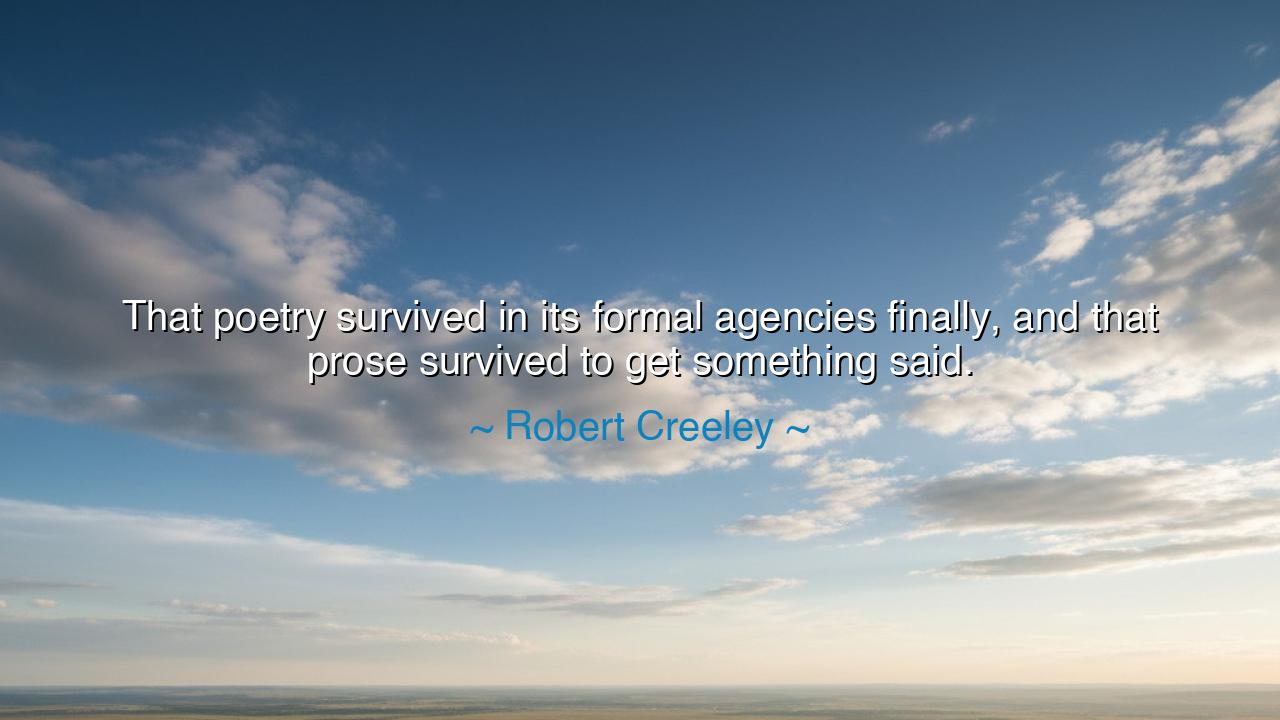
That poetry survived in its formal agencies finally, and that
That poetry survived in its formal agencies finally, and that prose survived to get something said.






“That poetry survived in its formal agencies finally, and that prose survived to get something said.” Thus speaks Robert Creeley, poet of spareness and precision, whose lines stripped away ornament to reveal the bone of truth. In these words, he separates the destinies of two great streams of language: poetry, which endures through its forms and structures, and prose, which persists because it carries meaning plainly. His declaration is not lament but recognition, that poetry and prose, though born of the same tongue, survive for different reasons.
The meaning of this saying lies in the acknowledgment of poetry’s reliance on form. For Creeley, the essence of poetry is not only what it says, but how it is shaped—its rhythm, its line breaks, its patterns of sound. These “formal agencies” preserve poetry across centuries, for even when its subject matter fades, the beauty of its structure continues to sing. Prose, by contrast, is valued because it gets something said—it communicates, it explains, it endures because it delivers meaning directly. Thus the one is kept alive by form, the other by function.
The origin of Creeley’s insight is found in his place among the Black Mountain poets, a group deeply concerned with the mechanics of language and the life of the line. Creeley was known for his brevity, his refusal of excess, his sense that the form of a poem was itself its meaning. For him, poetry could not survive as vague sentiment—it survived only through its disciplined attention to sound, rhythm, and shape. In prose, however, he recognized a different endurance: its survival was tied to its ability to carry information, to preserve ideas across time.
Consider the story of Homer’s epics. The Iliad and the Odyssey survived for centuries before they were written, carried by oral singers who relied on strict forms of meter and repetition. These formal agencies ensured memory, ensured survival. Without form, the stories would have been lost. By contrast, think of Caesar’s Commentaries, written in prose. They endure not because of beauty of form, but because they “got something said”: they conveyed history, politics, and personal power in direct words. Here is the very truth Creeley proclaims.
The lesson here is that we must understand what each form of writing demands of us. If we would write poetry, we must honor form, craft, and rhythm, for without them the work dissolves into mere sentiment. If we would write prose, we must be clear, direct, and faithful to meaning, for its power lies not in ornament but in transmission. To confuse these is to risk losing both. The poet who neglects form loses poetry; the writer of prose who buries meaning loses communication.
Practically, this teaching calls us to discipline. When you write a poem, pay attention to the agencies of form—meter, rhythm, imagery, the integrity of the line. Let your words survive not only because of what they mean, but because of how they are shaped. When you write prose, ensure that you get something said—that your ideas are clear, your meaning unclouded. Both forms demand respect, but in different ways, and wisdom is to honor their distinct strengths.
Thus the teaching endures: poetry and prose walk different paths of survival. One lives because its form is immortal music, the other because it speaks plainly what must be said. Creeley’s words remind us that language is not a single tool but a double-edged gift, offering both beauty and clarity, both form and function. Let us then learn from him, and use each with reverence—so that our poetry may sing beyond our years, and our prose may carry truth where it is needed most.






YTThich Yen Tinh
Creeley’s distinction between poetry and prose raises an interesting question about the role of each. Is poetry meant to survive because of its artistry, while prose exists as a more straightforward tool for communication? I find myself wondering if that’s true for all forms of writing, or if there’s a blend between the two that can both get something said and endure through form and structure.
HVho le ha vy
This quote by Creeley seems to suggest that poetry endures because of its form, while prose simply exists to get a message across. Does that mean prose is less meaningful, or is it just more practical? I wonder if there’s a point where prose can transcend its utilitarian nature and become poetic, or if poetry and prose are meant to serve fundamentally different purposes in language.
MManh
Creeley’s comment makes me wonder: is there a distinction between poetry that ‘survives’ because of its form and prose that simply aims to communicate? Can prose ever be as poetic as poetry, or is its power rooted solely in getting a message across? It’s an intriguing thought, and I’d love to explore how different forms of writing carry different kinds of weight in our society.
TMThanh My
The idea that prose 'survived to get something said' seems to imply that prose is more direct and functional than poetry. Does this mean that prose is just a tool for communication, while poetry is a form of art that endures because of its structure? It’s interesting how Creeley draws a line between the two, suggesting that prose is more utilitarian, but still essential for sharing ideas.
MANguyen mai anh
I’m curious about what Creeley means by poetry surviving 'in its formal agencies.' Is he referring to the traditional forms of poetry, like rhyme and meter, or something more abstract, like its ability to evoke emotions in a structured way? It makes me think about whether the form itself gives poetry its lasting power, or if it’s more about the content and the connection it creates with the reader.